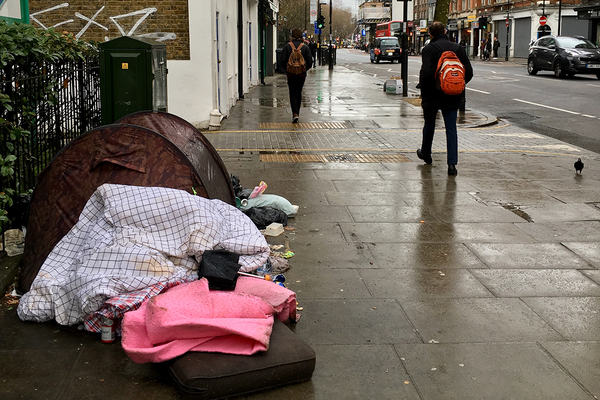You are viewing 1 of your 1 free articles
Rough sleeping strategy ‘must address welfare and supply’
The government’s Rough Sleeping Strategy must address issues of welfare reform and housing supply if it is to succeed, experts involved in developing it told Inside Housing.
The strategy, published on Monday, set out a £100m funding pledge aimed at eliminating rough sleeping by 2027.
The strategy set out a “three-pronged approach” of prevention, intervention and recovery but did not address issues relating to welfare reform or housing supply.
However, a government spokesperson said only half of this resembled new commitments of cash, including £30m from NHS budgets.
Jean Templeton, chief executive at youth homelessness organisation St Basils, was on the advisory panel for the Rough Sleeping Strategy. She described it as “a good starting point” but added there was “an awful lot more to be done”.
“We have to look at access to affordable housing, mental health services and welfare support,” she said. “We have to address the fact that Local Housing Allowance levels don’t come anywhere near the levels of rent expected in the private rented sector.”
Rick Henderson, chief executive of charity Homeless Link, also sat on the advisory group for the strategy, while members of his team were placed on task groups that suggested recommendations for the report.
“There is a fairly big difference between what we recommended and what is in the final document,” he admitted.
“I don’t think the strategy goes far enough – the big issues we raised on welfare reform and housing supply have not been addressed to the extent we would have liked.”
Mr Henderson called for a national roll-out of Housing First, a modern approach to helping the long-term homeless that started in New York and has been growing in the UK. Pilots are being funded in Liverpool, Manchester and the West Midlands, and the government has pledged an extensive evaluation of these.
But Mr Henderson said: “You are talking about people at the bottom of the housing ladder – not even on it – and the only light at the end of the tunnel was Housing First. The evidence base is already very compelling, we don’t agree that it needs to be piloted.”
He added that the cash announced by the government to back the strategy, while welcomed, was not enough.
“A hundred million pounds over two years is a significant amount of money. But I feel it will not be enough to meet the target of ending rough sleeping in 10 years. We don’t need short-term gimmicks, we need a long-term strategy backed by long-term resources,” he said.
“We will press for a longer-term funding settlement and I would like to see the money reaching the homelessness charities working on the front line. I don’t want to see it disappearing into a local authority black hole.”











